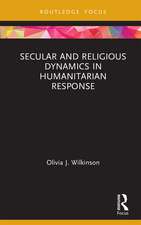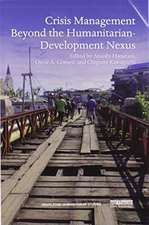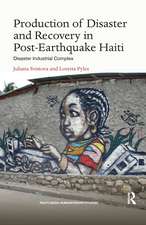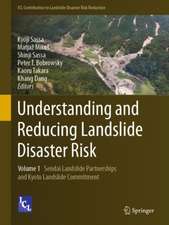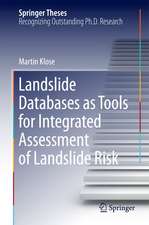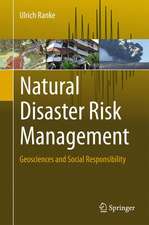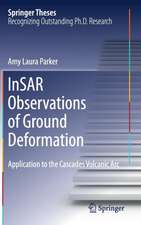Robust Simulation for Mega-Risks: The Path from Single-Solution to Competitive, Multi-Solution Methods for Mega-Risk Management
Autor Craig E. Tayloren Limba Engleză Paperback – 23 aug 2016
| Toate formatele și edițiile | Preț | Express |
|---|---|---|
| Paperback (1) | 381.98 lei 6-8 săpt. | |
| Springer International Publishing – 23 aug 2016 | 381.98 lei 6-8 săpt. | |
| Hardback (1) | 392.21 lei 3-5 săpt. | |
| Springer International Publishing – 20 noi 2015 | 392.21 lei 3-5 săpt. |
Preț: 381.98 lei
Nou
Puncte Express: 573
Preț estimativ în valută:
73.10€ • 76.04$ • 60.35£
73.10€ • 76.04$ • 60.35£
Carte tipărită la comandă
Livrare economică 14-28 aprilie
Preluare comenzi: 021 569.72.76
Specificații
ISBN-13: 9783319369075
ISBN-10: 3319369075
Pagini: 164
Ilustrații: XXI, 164 p.
Dimensiuni: 155 x 235 mm
Greutate: 0.27 kg
Ediția:Softcover reprint of the original 1st ed. 2015
Editura: Springer International Publishing
Colecția Springer
Locul publicării:Cham, Switzerland
ISBN-10: 3319369075
Pagini: 164
Ilustrații: XXI, 164 p.
Dimensiuni: 155 x 235 mm
Greutate: 0.27 kg
Ediția:Softcover reprint of the original 1st ed. 2015
Editura: Springer International Publishing
Colecția Springer
Locul publicării:Cham, Switzerland
Cuprins
Introduction: Initial Queries Going Forward.- The Deductivist Theory of Probability and Statistics.- The Frequency Theory of Probability.- Probability and Randomness as Beliefs: Bayesian Theory.- More Challenges to Tradition: Extreme Value Diagnostics, Power Laws, and the Wobble.- Mathematization of Statistics: Flexibility and Convergence.- Robust Simulation and Non-linear Reasoning: Quantitative and Qualitative Examples.- Managing Expectations: Qualitative Considerations And Quantitative Decision Procedures.- Conclusions and Queries.
Textul de pe ultima copertă
This book introduces a new way of analyzing, measuring and thinking about mega-risks, a “paradigm shift” that moves from single-solutions to multiple competitive solutions and strategies. “Robust simulation” is a statistical approach that demonstrates future risk through simulation of a suite of possible answers. To arrive at this point, the book systematically walks through the historical statistical methods for evaluating risks. The first chapters deal with three theories of probability and statistics that have been dominant in the 20th century, along with key mathematical issues and dilemmas. The book then introduces “robust simulation” which solves the problem of measuring the stability of simulated losses, incorporates outliers, and simulates future risk through a suite of possible answers and stochastic modeling of unknown variables. This book discusses various analytical methods for utilizing divergent solutions in making pragmatic financial and risk-mitigation decisions. The book emphasizes the importance of flexibility and attempts to demonstrate that alternative credible approaches are helpful and required in understanding a great many phenomena.
Caracteristici
Sheds light on many innovative ideas and pragmatic approaches for tackling natural and man-made mega-risk issues Lays the framework from both a philosophical and pragmatic perspective as to why divergent answers from competitive approaches to mega-risk problems are not only a necessity but also an unavoidable Develops a process for incorporating outliers of predicted future losses in the analysis of future risks Discusses various analytical methods to utilize the divergent solutions in making pragmatic financial and risk-mitigation decisions


